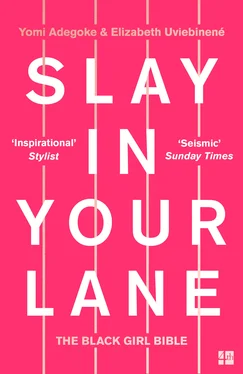1 ...7 8 9 11 12 13 ...17 It may be that we now feel less apologetic about taking up space in a country that is rigged against us but which many of us still consider ours. But even with our newfound ability to speak up, some students still remain negatively affected by racism at university. In fact, the government was called on to take ‘urgent’ action after it emerged that black students are more than 50 per cent more likely to drop out of university than their white and Asian counterparts. More than one in ten black students drop out of university in England, compared with 6.9 per cent of the whole student population, according to a report by the UPP and Social Market Foundations. 20The government have made a whole heap of noise about increasing the numbers of black students enrolled at certain British universities, but the problem of how to keep them has been largely neglected. London universities are more likely to have a higher proportion of black students in attendance – and it’s no coincidence that London has the highest drop-out rate of all the English regions, with nearly one in ten students dropping out during their first year of study.
‘My best friend at Oxford, she dropped out in the third year,’ Afua says. ‘She was doing a four-year degree and she dropped out because she felt like she wasn’t good enough. She just didn’t believe in herself enough, she couldn’t cope. It was literally just Imposter Syndrome, like, “Everyone else is better than me, cleverer than me and they deserve to be here.” She went to a state school, she had a multiple sense of illegitimacy there and she took a year out, she came back and she got a first. I found that interesting because there was no question about her intelligence or her deserving to be there; it was just that sense of acceptance. I think it’s really common – I was reading a report about how drop-out rates are higher for black students, and I’ve been mentoring a student, who, ironically, is from a very similar background to my friend and doing the same degree, and who just dropped out last year. It’s so frustrating that you can’t tell someone to stay somewhere that makes them feel unhappy but you do wonder, if this person had been supported, would this have happened?
‘I think universities just assume that their jobs are to just get a few black people through the door. They have no sense of the extra emotional burden that we carry by being there, so they don’t do anything proactive to support us. I nearly dropped out in my first year and it was basically like: if you’re not up for it, then good riddance. There was no “How can we support you?”, “What’s going on here?”, you know? There was just no intellectual curiosity as to what this phenomenon was, which ironically just confirmed why I wasn’t supposed to be there anyway, because the possibility of me not being here doesn’t remotely bother anyone.’
The reasons why black students’ drop-out rate is higher than other groups are complicated and multifaceted. According to one report, 21many universities struggle to respond to the ‘complex’ issues related to ethnicity, which tend to be ‘structural, organisational, attitudinal, cultural and financial’. Other factors mentioned were a lack of cultural connection to the curriculum, difficulties making friends with students from other ethnic groups and difficulties forming relationships with academic staff, due to the differences in background and customs. The report also cited research showing that students from ethnic backgrounds are much more likely to live at home during their studies, perhaps making it less easy to immerse themselves in campus life. But Dr Nicola Rollock believes that not enough is being done to investigate the underlying causes of this:
‘My concern is that these issues aren’t looked at in any fundamental way: when they are, all black ethnic groups are amalgamated into one mass, and they shouldn’t be. The data doesn’t speak to distinct differences. And there’s also a fear of talking about race. If they’re talking about black and minority ethnic students, race needs to be a fundamental part of that conversation, but I would argue that as a society, and certainly within the academy and within education policy, race is a taboo subject. People are scared of talking about race and when they do, they do so in very limited terms. They believe that treating everybody exactly the same is the answer. Or particular tropes will come out for example: “These groups need mentoring,” or “These groups lack confidence,” or that “There are not enough groups coming through the education pipeline,” and while I’m certainly not rejecting any of these points, I argue that to only focus on such issues is to miss the wider picture. Some people do have confidence but yet they are not progressing. How do you explain that? So I think there is a real limited and poor engagement with race both within the academy and education more broadly.’
.....................................................
‘Sound so smart, like you graduated college.’
.....................................................
Going on to higher education, wherever it may be, and for whatever period of time, is an achievement. To choose to extend your full-time education, to opt in to taking more exams and willingly take on ever-increasing student debt, is deserving of a pat on the back. But it’s notable that while black British youths are more likely to go to university than their white British peers, 22they are also much less likely to attend the UK’s most selective universities. This is not an indictment of the universities that aren’t ranked at the top of the league tables, nor is it an endorsement of the frankly elitist system that sees some universities undervalued. Further education is just that: the furthering of education, and wherever that happens it should be valued. But it’s important to interrogate why the under-representation of black people in these institutions occurs, especially when statistics show that there are more young men from black backgrounds in prison in the UK than there are undergraduate black male students attending Russell Group universities. 23Black Britons of Caribbean heritage make up 1.1 per cent of all 15- to 29-year-olds in England and Wales and made up 1.5 per cent of all British students attending UK universities in 2012–13. 24Yet just 0.5 per cent of UK students at Russell Group universities are from Black Caribbean backgrounds, 25and there is little understanding of why this is the case.
One given reason is grades: black students are less likely to achieve the required results for entry to highly selective universities, which could help account for their lower rates of application. 26The stumbling blocks that affect black students in school are outlined in the previous chapter, and help contextualise why this often happens. But the more pressing issue that many gloss over is that even when they do achieve the same results, 27black applicants are less likely to be offered places than their white peers. In 2016, despite record numbers of applications and better predicted A-level grades (and the fact that UCAS predicted 73 per cent of black applications should have been successful), 28only 70 per cent of black applicants received offers of places, compared to 78 per cent of white applicants.
In the same year, Oxford University’s offer rate for black students fell to its lowest level since 2013, with just one in six being offered places, compared to one in four white students. In 2016 again, just 95 black students were offered Oxbridge places – 45 by Oxford and 50 by Cambridge. The 50 black students offered a place at Cambridge were chosen from just 220 applications, but the rate of offers to black students was far lower than that of white students: 22.2 per cent of black students who applied to Cambridge were offered a place, compared with 34.5 per cent of white students. Similarly, at Oxford University the offer rate for black students was just 16.7 per cent, while 26.3 per cent of white students were offered a place. The lack of black students at these institutions often leads to confusion, shock and at times outright disbelief from those both in and outside the uni on the rare occasions when they encounter them. Afua was on the receiving end of this many times during her student years:
Читать дальше












